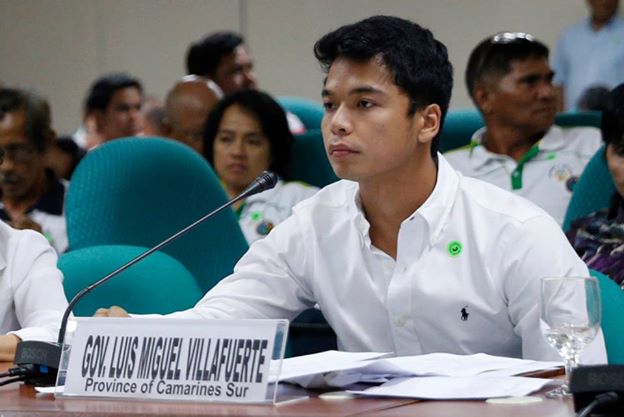Breaking
SC denies grandpa Villafuerte’s petition vs grandson-governor
NAGA CITY -– Wondering why Camarines Sur Governor Miguel “Migz” Luis Villafuerte is sitting pretty and comfortably in his swivel chair as the provincial chief executive?
Many may have not known this yet but the petition of Luis R. Villafuerte, the grand old man of the Villafuerte political clan, to cancel grandson Miguel “Migz” Luis Villafuerte’s certificate of candidacy (COC) — and thereby disqualifying the latter to assume the gubernatorial post, has been denied by the Supreme Court (SC) with finality.
The SC’s decision was posted on its website dated Feb. 25, 2014 but was chanced upon by this writer only on Friday.
In its website, the highest court exhaustively explained why the elder Villafuerte’s argument that grandson Miguel’s use of the nickname “LRay-Migz Jr.” is “material misrepresentation” did not hold water.
The SC’s decision was penned by Associate Justice Diosdado M. Peralta and concurred in by Chief Justice Maria Lourdes P. A. Sereno and Associate Justices Antonio T.
Carpio, Prebistero J. Velasco Jr., Teresita J. Leonardo-De Castro, Lucas P. Bersamin, Mariano C. Del Castillo, Roberto A. Abad, Martin S. Villarama Jr., Jose Portugal Perez, Jose Catral Mendoza, Bienvenido L. Reyes, Estela M. Perlas-Bernabe, and Marvic Mario Victor Leonin.
Luis, who filed the petition for certiorari against the Commission on Elections (Comelec) for denying his petition, elevated to the SC the resolution of the issue whether or not the use of LRay-Migz Jr. constitute “material representation.”
Listed among the jurisprudence in the February decision of the SC, it established that “the name which respondent (Miguel) wrote in his COC to appear in the ballot is not considered material misrepresentation under Section 78 of the Omnibus Election Code, as it does not pertain to his qualification or eligibility to run for an elective public office.”
Luis claimed that his grandson Miguel committed material misrepresentation when he declared in his COC that his name/nickname to be printed in the ballot was “Villafuerte, LRay Jr.-Migz” instead of his baptismal name.
And “that such declaration made under oath constitutes material misrepresentation even if the misrepresentation did not refer to his qualifications but referred to his eligibility to be validly voted for as a candidate, and consequently, to his eligibility to assume office.”
But the SC did not find merit in Luis’ argument and cited Section 73 of the Omnibus Election Code that states that no person shall be eligible for any elective public office unless he files a sworn COC within a period of 15 days.
Citing the SC jurisprudence in Salcedo II vs. Commission on Elections, the highest court did not even consider as misrepresentation the use of surname of a husband of a candidate when the petitioner claimed the marriage was null and void.
The Supreme Court also ruled that Sec. 78 of the Omnibus Election Code that false representation must consist of deliberate attempt to misled, misinform or hide a fact which could otherwise render a candidate ineligible.
“As we said, respondent’s nickname is not considered a material fact, and there is no substantial evidence showing that in writing the nickname “LRAy Jr. Migz” in his COC, respondent had the intention to deceive the voters as to his identity, which has an effect on his eligibility or qualification for the office he seeks to assume,” the Supreme Court decision said.
So, the highest court find no grave abuse of discretion committed by the Comelec en banc in finding that respondent did commit material misrepresentation in his COC.






















